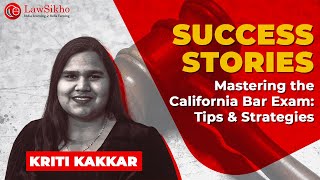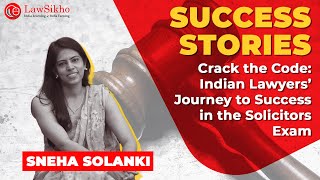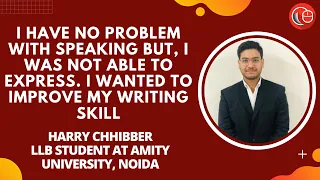Introduction
English is the weak link in many lawyers' careers. You can’t make it to a good law firm unless you have strong English communication, both in speaking and writing. You are likely to be judged by clients, peers, employers and judges harshly if you do not have good English communication. In High Courts or Supreme Court, it is impossible to do well unless you are really good with your English communication.
Substantive skills often come after your language skill, and not having good English communication is almost surely going to block your way from having a great legal career.
On the other hand, good English communication skills will open doors for you that are otherwise not available.
I am sure we need not convince those of you who are struggling with English proficiency as to why you must learn it.
We bring to you the most advanced course for lawyers to learn English - speaking, writing and communicating effectively and accurately, at a professional level.
If you buy an annual subscription, you only pay INR 50,000. Inclusive of taxes. Please note that we expect to increase the price to around 1 lakh per year in the future, as we can serve only a small class size given the way the course is designed.
Hard copy material will be provided to those who enrol for an annual subscription free of cost. An interest-free financing option from Bajaj Finance is available to pay in easy instalments. Get in touch with our team to discuss this further.
LawSikho 30-45 days refund policy applies to this course.
Please note that while we are using legal material to teach this course as the legal context is useful for you, we are teaching no law here. And please do not expect the teachers to teach you any law in this course.
Who should take this course?
Your gateway to a rewarding and fulfilling career in the legal profession. In this dynamic field, where knowledge and skills are key, this course is designed to empower a diverse range of individuals:
- Lawyers who want to move from practising law in various vernacular languages in local courts to practicing in the High Court or Supreme Court where English is mandatory.
- Law students who are struggling to get jobs or internships due to the language being a barrier.
- Lawyers who want to work on their business communication, oratory, and writing skills
- Lawyers who are unable to bag top corporate clients due to lack of polished communication skills despite having good legal skills.
- Lawyers or law students who studied in the vernacular medium and are not able to access opportunities due to the language being a barrier.
- Lawyers who want to work in the judiciary or other government jobs.
- Lawyers who want to get a stable and well-paid job at an LPO.
- Lawyers who feel underconfident about their performance due to imperfect grammar and syntax and get harshly judged at the workplace for language errors.
- Writing IELTS or TOEFL? We are teaching you way more than what you need to score well in those exams.
- Highly recommended if you are looking to migrate to English-speaking countries as a lawyer or going to such countries for higher studies.
What are the skills you can expect to learn?
- Develop a powerful vocabulary that helps you express nuances and finer points of your arguments and ideas precisely.
- How to use the appropriate language for various specific legal scenarios.
- Effective communication in client counselling.
- Writing notices and replies.
- Drafting documents in perfect English.
- Command over important technical terms and jargons.
- Communication in mediation.
- Use of language and communication skills in negotiations.
- Article writing.
- Communication for business development.
- Crafting powerful courtroom arguments.
- Enhancing the delivery of arguments and responding to questions.
- Communication skills for impactful business meetings with corporate clients.
- How to prepare for meetings and personal interviews.
- How to give expert opinion or quotes to journalists.
- Preparation and delivery for job interviews.
- Effective communication for training juniors.
- Effective communication with colleagues and reporting managers.
- Effective communication with CEO, Director level business leaders.
- How to be effective on Youtube videos.
- How to be effective in guest lectures or training sessions.
- Effective communication for public relations and reputation management.
- How to prepare and strategize for your cross-examinations from a communication perspective.
- How to craft arguments that land on judges, clients, your boss and the other side (during negotiations) quickly,
- How to draft effective memos and opinions.
- How to draft public statements for your clients or organization.
What benefits can you expect from the course?
- Rapidly discover your weakest areas and frequently made mistakes and fix them for once and all.
- Write and speak flawless English within months.
- A smooth shift from drafting and arguing in vernacular languages to perfect English
- Learn oratory skills so that you can do better in court, give speeches in events and gatherings, develop your own social media presence through video communication, get more clients with higher-paying capacity.
- You will be able to communicate with foreign and English speaking clients effectively.
- You will drastically improve your communication as you will be more coherent, confident and clear, leading to greater success in your career.
- You will develop strong listening skills and conversational skills that would make you a better lawyer in court, client calls, meetings, and in negotiation situations too.
- Better communication skills will make you a better colleague at the workplace, a more effective leader to your juniors, and a more interesting person in your social circles.
- You will be able to draft in perfect English, in a concise and precise language that will bring you admiration from your peers, judges, and clients.
- Weekly vocabulary exercises, phrasal verbs, grammar and syntax training
- Legal vocabulary and Latin terms list
What is the course methodology?
- Audiolingual method - Using this method, a learner will be able to listen and speak much before reading or writing. It ensures that the session isn’t only focussed on textual understanding, but also on comprehending the set data.
- Oral and situational language teaching - This is based on a structural view of language. Speech, structures and focus on a set of basic vocabulary items are seen as the basis of language teaching. An analysis of English and a classification of its prominent grammatical structures into sentence patterns. It ensures that learners internalise grammar rules.
- Grammar translation - the transition from controlled structures to the freer practice of structures, and from oral use of sentence patterns to automatic use in speech, reading, and writing.
- Task-based language teaching
- Extremely interactive
- Immersive method
- Language and content amalgamated and taught through various CLIL methodologies (Content and Language Integrated Learning) :
- BILD - Bilingual integration of languages and discipline.
- LAC - Language across the curriculum.
- EMI - English as a medium of instruction.
- FLIP - Foreign language immersion programme.
- Focus on assimilation and application.
- Task-based explanation of concepts in order to ensure the thresholds are being met.
- Weekly charts will be given and effective implementation of the same will be done.
- Weekly questionnaires will be shared, to check the understanding of the pupil.
- A stipulated time will be allotted at the end of each class to ensure that the doubts/questions are being cleared in each session
What is the career potential after doing this course?
This course equips you with essential skills that are highly sought after in the legal industry. Let's explore the exciting career prospects awaiting you. Upon completion of the Diploma in Legal English Communication, graduates will have a competitive edge in various legal professions and related fields.
- Legal Translator/Interpreter: Facilitating communication between clients and legal professionals in multilingual settings.
- Legal Writer/Editor: Crafting and editing legal documents, articles, publications, and content for law firms, legal journals, or legal websites.
- Legal Consultant: Providing specialized communication training and consulting services to legal professionals.
- Corporate Legal Departments: Supporting in-house legal teams with accurate and effective communication in legal matters.
- Paralegal: Assisting attorneys in research, document preparation, and communication with clients.
- Court Reporter: Providing verbatim transcripts of legal proceedings, ensuring accuracy in documentation.
- Legal Educator/Trainer: Teaching legal English communication skills in educational institutions or through private training.
- Freelance Legal Communication Specialist: Offering services independently to law firms, legal departments, or individuals in need of specialized legal communication expertise.
Potential Employers
- Law firms
- Corporate legal departments
- Government agencies and ministries
- Non-profit organizations
- Legal consulting firms
- International organizations
- Judicial offices
- Legal publishing and journalism
Relevant Industries
- Law firms
- Corporate legal departments
- Government agencies and ministries
- Non-profit organizations
- Legal consulting firms
- International organizations
- Judicial offices
- Legal publishing and journalism
What kind of recruitment and placement support will I get?
- Unique Training Method: We're the sole organization in India offering comprehensive, exercise-based courses.
- Employer Recognition: Many leading employers, law firms, and companies actively seek our high-performing students.
- Career Opportunities: Success in our courses can lead to job placements, internships, and assessment internships in esteemed law firms, with renowned lawyers, and various companies.
- Empowering Learners: We focus on empowering learners with not just knowledge and skills, but also real-world opportunities.
- Dedicated Support Team: Our dedicated team is here to assist you with placements, internships, and freelance opportunities.
- Proven Success: Between April 2021 and June 2023, we've helped over 21,000 students secure job and internship opportunities.
- Media Recognition: Our achievements have been featured in respected media outlets like The Hindu, Business World, and India Education Diary.
- Impressive Value: Our students have secured over Rs. 2.7 Crore (USD 330,000) worth of work, with records of INR 30 LPA (USD 37,500) domestically and INR 50 LPA (USD 62,500) internationally.
- Comprehensive Support: From day one, our placement team guides you in setting goals, crafting standout CVs, enhancing interview skills, and supporting your critical first month on the job or during an internship.
- Trusted Recruiters: We've built strong collaborations with recruiters who prefer hiring our well-trained students.
- Competitive Edge: Partnering with us gives you an edge in the job market and opens doors to exciting career prospects.
What is unique about the course?
- Every week, you will work on one writing assignment, one editing exercise and one public speaking exercise based on a weekly learning objective
- We will work on a new theme every month, and cover a different legal situation or settings. For instance, if the theme in January would be cross-examination, in February it could be job interviews, in March it could be communicating with journalists and in April you may work on different kinds of notices.
- The goal of this course is not to teach you any legal work, but the English language and communication skills you need to succeed as a lawyer and these various legal tasks and situations only provide a context to this language and communications tutorials.
- The course is tough and intensive, you will not be awarded the certificate unless you complete the required number of assignments. You will have to invest 4-5 hours per week in developing your skills, in addition to the classes on this course.
- You will have interactive classes with high-quality discussions which will be taken by the experts of this course. You can get all the doubts resolved in the classes or even outside the classes through course groups and email.
- You will get personal attention and coaching from our trainers who will be assigned to you, and have access to a dedicated course anchor who will help you with submissions or any guidance or issues you may have as you progress through the course.
- You will receive in-line feedback for the assignments you submit, which will improve your performance to a significant extent.
- You will have access to other doubt clearing mechanisms also, in addition to the online classes such as a discussion forum where queries are responded to within a period of 48 hours, a WhatsApp group that will include your peers and batchmates as well as the course anchor, evaluator and support team from LawSikho.
- You will be trained in writing for six writing assignments during the term of the course and if these are of publishable quality, these shall be published on the iPleaders blog which sees a footfall of more than a million visitors a month.
Can I get remote freelance work after doing this course?
At LawSikho, we have two types of students: those who already possess good legal skills and those who are in the process of learning. We believe in enabling our learners to start earning from their knowledge without delay.
For students with professional-level legal skills, we offer opportunities in contract drafting, data & privacy, international business law, US immigration law, litigation support, and international IP law work, etc.
However, we understand that acquiring professional-level skills takes time. For those who are still developing their legal skills, we provide alternative work opportunities such as writing articles, conducting research, legal transcription, data entry, law firm administration, social media management, and more. Some students even engage in tasks like voice-over work, data compilation, translation, and virtual assistance.
We have established a dedicated team that actively pitches to organizations in the US to help LawSikho students find remote work.
We have set up a US entity to bridge the trust gap between US legal professionals and an organization operating from India.
We focus on getting learners their first three clients, guiding them in crafting impressive proposals. By the time they secure these initial clients, learners become well-adjusted to the process and can independently attract more clients.
They build their CVs and profiles with real work experience and testimonials, opening doors to numerous opportunities.
Getting started is often the hardest part, but at LawSikho, we make the process frictionless. We have witnessed law students earning well over $1000 per month.
Some students have earned $500 in their first month as a side gig. We have students who, after a year, now earn $10,000 per month. While some may start with $300, they make progress by learning new skills, improving their profiles, and pitching for higher-paying work.
Between April 2021 and June 2023, we created over 21000+ opportunities for our learners, resulting in thousands of students securing freelance work. The total value of work secured amounts to over $3,30,000 (Aprox INR 2.7 Crore). Additionally, hundreds of individuals found employment, and secured internships.
Please note that these numbers represent the initial gigs facilitated directly by us or those on which we actively collaborated with the learners. Students have also secured additional work beyond our tracking.
Our Learners
Toppers' Testimonials

I enrolled for the LawSikho Diploma in English Communication with the intent to enhance both my oral and written communication skills. With about a trimester into the course and after attending 40 odd interactive sessions, I believe I am closer to achieving my objectives.
The course, with its emphasis on building a strong foundation in grammar, has also provided me with an impetus to read a plethora of articles and incrementally improve my vocabulary. The interactive nature of the course is quite refreshing and has made me lose my inhibitions of public speaking. Also, as an instructor, whenever required, Swaneet has shared constructive feedback which not only helped me improve my communication skills but also bolstered my confidence.
Investing three odd hours a week and an hour more in writing assignments has started paying dividends as I subconsciously incorporate the knowledge gained in my day to day communication. While I did procrastinate initially, I am gratified to have made a sagacious decision of joining this truly profound course.
I really want to thank both Swaneet and LawSikho team for creating an insightful and a very hands-on programme.
 Kunal Deshmukh Law Student
Kunal Deshmukh Law Student
How will you clear my doubts and help me if I am struggling to understand or learn a concept?
- In our live classes, you can ask questions, share your screen, receive personal feedback, and have your doubts cleared.
- If you need more help after getting feedback on an assignment or want career advice, you can schedule a private one-on-one call. Our evaluators and mentors are here to assist you and give you advice that's tailored to your needs.
Money-back Guarantee
We're so confident that you'll love it that we offer a 100% money back guarantee. Here's the deal: enroll in the course, give it your best shot for a month by attending classes and doing all the exercises. If you still don't feel like you're getting value from it or it's just not clicking with you, no worries! We'll happily refund the entire course fee. The only catch is that you need to give it a fair shot for a month. If you're not satisfied after that, we'll gladly give you your money back.
Your success and satisfaction are our top priorities!
Specific Learning Objectives
Grammar, Syntax and Reading comprehension
All the following segments will be taught through legal material, incorporating legal texts, articles, judgements, in order to enhance the understanding. There will be worksheets provided pertaining to the respective topic that is taught in each class. Reading and understanding a text is equally important. There will be comprehensions based on the respective topic taught each week. The comprehension text is also built on legal texts. We have adapted a holistic approach, in order to understand each parameter of learning a language efficiently.
- Week 1 - Introduction to basic grammar concepts in order to understand simple structures.
- Week 2 - Introduction to subject pronouns, to build a stronger base for further understanding of conjugations.
- Week 3 - Understanding Verbs - static, auxiliary, action.
- Week 4 - Profound and coherent understanding of verbs.
- Week 5 - Understanding the complexities of verbs.
- Week 6 - Stative Verbs and their functions in sentence structures.
- Week 7 - Incorporating Infinitives and constructing sentences.
- Week 8 - Recognition of Infinitives and its assimilation towards various direct purposes in sentences.
- Week 9 - Introduction to tenses.
- Week 10 - Understanding the Present tenses and their myriad uses.
- Week 11 - Future forms and assimilation.
- Week 12 - Introduction to Relative Clauses and incorporating the same in complex clauses and sentences.
- Week 13 - Using the past tense to express the present and future. The why and the how.
- Week 14 - Future continuous and its uses.
- Week 15 - Introduction to Conjunctions, its types, and clauses.
- Week 16 - Linking words to express disagreement and contrast.
- Week 17 - Phrasal verbs and their uses. Assimilation of the same in free speech.
- Week 18 - Introduction to Cleft sentences and their uses in adding emphasis to various parts in a sentence.
- Week 19 - Native speaker mistakes - recognition, understanding, rectifying.
- Week 20 - Complex native speaker mistakes - Irregularities and conditions of the same.
- Week 21 - Using Future tense as a tool to speak of the past - plans, predictions, and plans.
- Week 22 - Understanding articles and their importance in sentence construction. Kinds of articles and comprehending whether a sentence needs one or not.
- Week 23 - Understanding obligations and the correct way to express the same.
- Week 24 - Correct usage of for and since in present perfect tense.
- Week 25 - The differentiation between Future tense and Near Future tense.
- Week 26 - Understanding the difference between might, may, and could for expression various possibilities.
- Week 27 - Grasping and correct usage of structures like - too much, too many, enough, not enough, and very.
- Week 28 - Using comparatives and superlatives in free speech across all parameters.
- Week 29 - Advanced learner mistakes and avoiding the same.
- Week 30 - Essential Discourse Markers and their usage.
- Week 31 - Subject-Verb agreement and sentence construction.
- Week 32 - Subject-Verb agreement and it’s implied usage.
- Week 33 - Subject-Verb agreement advanced understanding of the usage and incorporating the same in language.
- Week 34 - Understanding the word ‘wish,’ the difference and correct usage.
- Week 35 - Incorporating soft skills with spoken English.
- Week 36 - Advanced Discourse Markers and usage of the same in free speech.
- Week 37 - Question tags, their placement and the right manner of usage in order to extract the correct information.
- Week 38 - Understanding Participles and using the same as a subordinate clause so as to express effectively in fewer words.
- Week 39 - Introduction to First Conditional, and sentence construction.
- Week 40 - Incorporating Second Conditional, and building complex sentences.
- Week 41 - Understanding Third Conditional, and it’s effective usage in all parameters for widening the language base.
- Week 42 - The intricate and essential difference between ‘if,’ and ‘whether.’
- Week 43 - The finer nuances between ‘let,’ and ‘allow.’
- Week 44 - Understanding adjectives and adverbs, and then moving onto Comparative adjectives and adverbs.
- Week 45 - Linking devices of contrast to aid better sentence formation.
- Week 46 - Understanding Intensifiers and their usage.
- Week 47 - Understanding complex Punctuation and its usage.
- Week 48 - Different forms of writing texts in order to produce effective arguments.
- Week 49 - Styles of writing and speaking
- Week 50 - Zero articles and its usage
- Week 51 - Singular and plural of irregular nouns
- Week 52 - Enhancing understanding and expression in text and speech
Listening and Oratory
- Week 1 - Greeting a police officer on a phone call
- Week 2 - Talking to a client to gather information
- Week 3 - Asking client for the right documents you need urgently to submit with a bail application
- Week 4 - Identifying the questions that a judge may ask during 156(3) hearing and preparing answers for them
- Week 5 - Seeking information from various departments regarding name, designation, contact details, etc. so as to draft an application to the respective person.
- Week 6 - Understanding the grounds for the rejection of the RTI, and discussing the way forward with colleagues and seniors.
- Week 7 - Discussing with journalists about how the government is withholding important and essential information; requesting them media coverage for the same.
- Week 8 - Briefing a lawyer to argue on your behalf.
- Week 9 - Convincing the perpetrator over a phone call to take a post down.
- Week 10 - Explaining to the media the reason before filing a defamation suit.
- Week 11 - Giving instructions and guidelines to a junior lawyer on how to draft a counter-affidavit.
- Week 12 - Discussing a strategy with your seniors about drafting written statements.
- Week 13 - Negotiate Non-disclosure Agreement
- Week 14 - Negotiate Co-founders Agreement
- Week 15 - Asking your senior for further instructions in order to draft notice for breach of contract.
- Week 16 - Pointing out to a counterparty that they are not acting in good faith.
- Week 17 - Talk to a customer representative regarding deficiency of service.
- Week 18 - Give feedback to your colleague regarding the first draft of a consumer complaint.
- Week 19 - Preparing a speech to present your case before a judge.
- Week 20 - Consulting a senior lawyer regarding the appeal.
- Week 21 - Make a video for YouTube describing your best day as a lawyer.
- Week 22 - Call up a lawyer inviting him/her to co-author a blog post.
- Week 23 - Make a video review of your favourite movie and tweet the same, tagging the director.
- Week 24 - Invite a potential employer or a lawyer that you respect to do a webinar with LawSikho. Call a mentor you respect very much to do a webinar with LawSikho, and if he agrees, call up the webinar coordinator from LawSikho
- Week 25 - Record a video review of the top 10 legal podcasts in the world as per you
- Week 26 - Brainstorm with a group of lawyers regarding how a certain podcast episode can be improved
- Week 27 - Write the script for an episode of your own podcast
- Week 28 - Strategize with a friend how you will entice a top lawyer to come to your podcast for a candid interview
- Week 29 - Explain to the group who is your favourite mooter on Youtube and why
- Week 30 - Explain 2 things you liked about a moot speech and 2 things you didn’t like
- Week 31 - Argue with logic - why should India be allowed to join the UN security council?
- Week 32 - Argue an issue from a moot court problem for 5 minutes
- Week 33 - Review a notice invoking arbitration and prepare a strategy to counter - together with a colleague
- Week 34 - Frame questions to ask an expert witness who you are going to bring before an arbitral tribunal
- Week 35 - Frame questions to cross-examine an expert witness introduced by your opposite party - in a respectful and polite way
- Week 36 - Framing the issues during a negotiation - practice with your batchmates
- Week 37 - Discuss your BATNA with a colleague
- Week 38 - Discuss the negotiation strategy with your client and take his/her consent.
- Week 39 - Make a concession during a negotiation deal and make a big deal out of it.
- Week 40 - Console a client who is extremely scared regarding going to jail.
- Week 41 - A client is hiding information while discussing the matter with you. Ask the necessary questions in order to find out the details.
- Week 42 - Persuade your client to pay the bills quickly.
- Week 43 - During a mediation, reconcile two opposing parties, who are unable to come to a common platform due to emotional issues.
- Week 44 - Review a resume and help your friend to find a suitable job.
- Week 45 - Informational interview
- Week 46 - Mock interview
- Week 47 - Seek feedback from the interviewer about your performance and what you can improve
- Week 48 - write a speech about your journey of learning to speak English
- Week 49 - Understanding kinds and styles of speaking and writing through audio and visual stimuli
- Week 50 - Articles and their impact on speech
- Week 51 - Enhancing the understanding of irregular nouns and working on structure in free text and speech (Listening & Oratory)
- Week 52 - Enhancing understanding and expression through visual and audio stimuli
Writing
-
Week 1 - Identifying Parts of Speech in various texts and producing texts highlighting the same.
-
Week 2 - Understanding subject pronouns and it’s usage in written text. Creation of texts around the same.
-
Week 3 - Creation of text based on verbs and its types.
-
Week 4 - Understanding various nuances of verbs, identifying and creation of texts.
-
Week 5 - Recognising gerunds and Infinitives in various texts and producing texts pertaining to the same.
-
Week 6 - Stative Verbs and its usage, practising the same by creating text.
-
Week 7 - Constructing sentences using Infinitives.
-
Week 8 - Creating sentence structures targeting infinities of purpose.
-
Week 9 - Introduction to Tenses, identifying the same in various texts generating texts for better assimilation.
-
Week 10 - Uses of present tense, in various ways, and creating content on similar lines.
-
Week 11 - Creation of text pertaining to future forms of verbs.
-
Week 12 - Using Relative clauses for better sentence structures.
-
Week 13 - Creating text that highlights the use of past tense to talk about present and future.
-
Week 14 - Usage of future continuous tense, identification and creation.
-
Week 15 - Using various types of Conjunctions in clauses — recognition and building complex sentences.
-
Week 16 - Understanding contrasting linking words and creating texts in order to assimilate and apply the same in free speech.
-
Week 17 - Identifying and using phrasal verbs in written text to enhance sentence formation.
-
Week 18 - Using cleft sentences for augmented use of language.
-
Week 19 - Creation of text by highlighting, identifying, and avoiding native speaker mistakes.
-
Week 20 - Creation of text by highlighting, identifying, and avoiding advance native speaker mistakes.
-
Week 21 - Using Future tense for talking about the past and creation of text on similar lines.
-
Week 22 - Using and avoiding articles as per the need of the sentence. Generating text to assimilate the same.
-
Week 23 - Understanding sentences that demonstrate obligation and producing text.
-
Week 24 - Creating content by using for and since correctly.
-
Week 25 - Producing content which underlines the difference between Future tense and Near-Future tense.
-
Week 26 - Using might, may, and could for expressing possibilities by generating written content on similar lines.
-
Week 27 - Using too much, too many, enough, etc. correctly and creating text in order to understand the finer nuances of the language.
-
Week 28 - Using Comparatives and Superlatives in free written text.
-
Week 29 - Identification and rectification of advance learning mistakes. Creation of text in order to understand and avoid the same.
-
Week 30 - Using Discourse markers in complex sentences.
-
Week 31 - Understanding Subject-Verb agreement, practising the same by creating text.
-
Week 32 - Understanding finer nuances of Subject-Verb agreement, using the same effectively by producing articles.
-
Week 33 - Using Subject-Verb agreement in complex sentences and generating blogs, texts, articles featuring the same.
-
Week 34 - Understanding the word ‘wish,’ and its various facades by creating content of each type.
-
Week 35 - Applying methods to tone down written speech for effective communication by practising the same.
-
Week 36 - Understanding advance discourse markers and using the same to create blogs, articles, etc.
-
Week 37 - Using question tags to obtain the required information in written context.
-
Week 38 - Understanding Participle clauses and effective implementation of the same in letters, essays, articles, etc.
-
Week 39 - Introducing First Conditional and practising the same by creating content.
-
Week 40 - Usage of Second Conditional in sentences and creation of text on similar lines.
-
Week 41 - Implying Third Conditional and using the same in creation of complex structures.
-
Week 42 - Understanding finer nuances between ‘if,’ and ‘whether.’ Creation of articles, blogs underlining the difference.
-
Week 43 - Using ‘let,’ and ‘allow,’ in written text and thereby assimilating the difference coherently.
-
Week 44 - Understanding adjectives and adverbs, moving onto comparative adjectives and adverbs and using the same effectively by writing articles, letters, blogs.
-
Week 45 - Using contrasting linking devices to highlight differentiation by producing text to exemplify the same.
-
Week 46 - Using Intensifiers to enhance the quality of written text.
-
Week 47 - Using simple and complex punctuation in order to make the text coherent and increase its effectiveness.
-
Week 48 - Understanding different forms of writing - argumentative, factual, etc. in order to produce the right text basis on the need of the respective need.
-
Week 49 - Assimilation of kinds and styles of writing
-
Week 50 - Understanding the usage of zero articles in various texts
-
Week 51 - Enhancing the understanding of irregular nouns and working on structure in free text and speech (Writing)
-
Week 52 - Enhancing understanding and expression through textual stimuli
Bonus topics - Mindset and Expression Training
-
Week 53 - RC: Formal communication
-
Week 54 - RC: Mindset and expression training - biases
-
Week 55 - RC Inclusivity communication and neutral communication
-
Week 56 - RC Assimilation of Listening, understanding and speaking skills
Monthly themes for activities and exercises along with weekly breakdown
June 2020
Police Investigation
Week 1
Drafting police complaints
Week 2
Bail applications
Week 3
Chargesheet
Week 4
Application before a magistrate to direct police to register FIR
July 2020
Right to information
Week 1
RTI Application
Week 2
Order rejecting RTI Application
Week 3
RTI Appeal before Appellate Officer
Week 4
Application before the State Information Commission or Central Information Commission.
August 2020
Defamation
Week 1
Social media posts that constitute defamation
Week 2
Defamation Suits
Week 3
Affidavit and counter-affidavit
Week 4
Written statements
September 2020
Contracts
Week 1
Non-disclosure Agreement
Week 2
Co-founders Agreement
Week 3
Breach of contract
Week 4
Acting in good faith and mitigation
October 2020
Consumer Complaints
Week 1
Notice for deficiency of service
Week 2
Draft of a consumer complaint
Week 3
Arguing your own matter before a judge
Week 4
The appeal against an adverse order
November 2020
Social media
Week 1
Connecting with potential clients on social media
Week 2
Blogging
Week 3
Connecting with celebrities on Twitter
Week 4
Connecting with potential collaborators or employers on LinkedIn
December 2020
Podcasts
Week 1
Top legal podcasts in the world
Week 2
How can you improve an episode of a podcast you already like
Week 3
Create your own podcasts
Week 4
Invite guests and interview on your podcast
January 2021
Moot courts
Week 1
Videos of various moot courts
Week 2
What makes these speakers better than the others
Week 3
10 best moot arguments ever
Week 4
Create an original moot problem
February 2021
Arbitration
Week 1
Notice invoking arbitration
Week 2
Statement of claim
Week 3
Expert witness
Week 4
Cross-examination
March 2021
Negotiations
Week 1
Information gathering and listening in the context of Negotiations
Week 2
Summarising positions, outlining areas of differentiations
Week 3
Creating negotiation strategies
Week 4
Making concessions
April 2021
Mediation
Week 1
Listening with empathy
Week 2
Understanding context and reading between the lines
Week 3
Persuasion
Week 4
Reconciliation
May 2021
Job interview and application
Week 1
Resume
Week 2
Job Application
Week 3
Interview preparation
Week 4
Interview
Training Methodology

Online 24/7 access
Access study materials via our online portal & via our anroid & iOS apps.

Practical Exercises
Two practical exercises every week, each followed by written feedback.

Live Online Classes
Live online classes based on exercises, allowing questions and feedback.

Convenient Class timings
Classes held after work hours, typically on Sundays or after 8 PM on weekdays.

Live Doubt Clearing
Live doubt clearing for support and one-on-one sessions with mentors.
Documents that would be used for language training
- Police complaint
- RTI related appeals, applications and communications
- Departmental notes
- Chargesheet
- Notices for breach
- Reply to a legal notice
- Contract to negotiate
- Sample complaints
- Sample bail application
- Sample applications for temporary injunctions
- A contract with lots of track change versions from two sides
- Settlement Agreements
- Sample CV for a mock job interview
- Sample articles
- Interrogatory Applications
- Statement of Claims
- List of Dates from an arbitration
- Defamation Suit
- Written Statement
- Writ petition
- Non-disclosure Agreement
- Co-founder Agreement
- Notice for breach of agreement
- Consumer complaints
- Moot memos
- Arbitration Notice
- Conciliation Order
- Statement of positions for negotiation
Industry Academia Panel

CEO and Co-Founder, iPleaders and LawSikho
Syllabus
Course Plan
Above prices are inclusive of all applicable taxes and charges.
 Free materials
Free materials
- Get Sample Material in your inbox
- Regular career guidance on email
- Sample Exercises
- Five very useful lessons
- No Certification for Free Material
 Standard
Standard
2 practical exercises/ Drafting exercises per week
Article writing assignments (on request)
1 online live class/week
Get digital access to entire study material
Hardcopy study materials- available on additional charges.
Access on LMS, Android & iOS app
Instructor feedback on assignments
Unlimited doubt clearing sessions.
Instructor led course with online live classes
Online exams (give exams as per your convenience on given time slots)
Certificate (by courier)
CV enhancement
Coaching for professional networking
Internship & Job Support
Interview preparation support
Content access for 3 years
Top performers are recommended for jobs and client opportunities (as applicable)
 Master Access
Master Access
Access to all of Lawsikho.com's courses for 4 years (including new courses launched in this period)
Immunity from future price increases for 4 years
Priority pass for personal coaching, doubt-clearing, customer-support
Personal feedback on as many assignments as you want
Priority processing for articles submitted to iPleaders blog and Superlawyer interview recommendations
FAQs
We recommend that you should have completed your Higher Secondary / Class XII from a recognized Board / University. In the case of foreign nationals, you should have completed the equivalent of Higher Secondary in India in your respective country. You should also be comfortable with the English language and using a computer. However, we have no formal pre-qualification requirements because we are not a University or college. Anyone who wants to learn is welcome to join our courses.
Students of LawSikho will be provided hard copy materials, we will dispatch it within 45 days of your course commencement date.
However, online classes, videos, regulatory updates and periodic upgrades to the courses cannot be included in the hard copies. We will provide you with hard copy material for all important chapters. We keep adding many new chapters from time to time and there are restrictions on page numbers so all online material cannot be available in hard copy. We would keep adding new material online from time to time, so please do not expect all such material to be made available in the hard copy also. You can use the hard copy materials for your reference, however, we recommend that you do not exclusively rely on hard copies for cracking the assessment test and the exercises. Please refer to the online library of materials from time to time.
Note: We will send hard copy material through our service partners. We have three service partners.
1. Indian Speed Post (Provides delivery ‘anywhere in India’ under contractual service)
2. Delhivery
3. Trackon Couriers Pvt Limited
If our service partners do not have a presence in your area and want to get the hard copy, you can send us a specific request.
LawSikho will not be responsible if the speed post bounces back or hard copy material is not delivered. We will levy the courier charge on you in such a scenario.
Please visit the respective course page to learn more about the hard copy study material policy of that course.
If international students require hard copy material, they need to share their correct address and we will let them know the cost of the courier which they need to pay and then the hard copy will be dispatched. This is the process because the cost of an international courier is very high compared to the domestic courier within India (for domestic courier we have no additional charges). Some international students provide us with an Indian address for couriering hard copy material. In those cases, we charge nothing extra for the courier.
A person can visit the official website of LawSikho and find the relevant course and see the course syllabus, learning objectives and even a list of weekly exercises. You can also subscribe for free sample material. If more clarification about the course is needed, feel free to chat with our online chat specialist. You could also call us on our landline number, +91 11 40845203 for further assistance.
We do not offer any demo classes. You will not understand the course's quality by attending a single class as the results we produce is done through a combination of many things - study material, assignments, personal feedback on assignments, and then finally, class. The only way to experience the course is to take the course for a month, risk-free, as we give no questions asked and refund between the 30th and 45th day provided you attend all classes and solve all the assignments.
The refund policy may vary. We advise you to go through the refund policy given on the respective course page to know the actual refund policy applied to you.





 Share
Share
 +91 80474 86192
+91 80474 86192 


 Learn from 3000 Rs/Month
Learn from 3000 Rs/Month  Get course syllabus
Get course syllabus















































 Key Highlights
Key Highlights




 ADDICTIVE LEARNING TECHNOLOGY LIMITED
ADDICTIVE LEARNING TECHNOLOGY LIMITED











